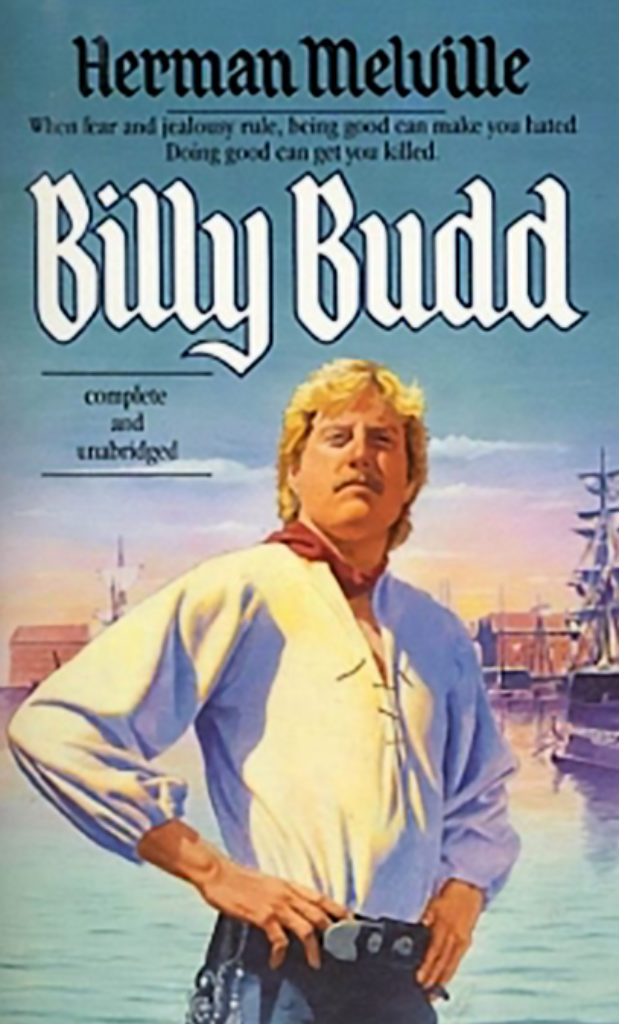Billy Budd by Herman Melville has been reviewed by Focus on the Family’s marriage and parenting magazine.

Billy Budd by Herman Melville has been reviewed by Focus on the Family’s marriage and parenting magazine.
Billy Budd is a handsome young seaman. His natural charm and charisma, along with his innocence, make him well-liked by his peers. Although he only knows himself to be an orphan who was found as a baby, some think a man so appealing must possess royal blood. Billy’s only obvious flaw is that he stutters when he becomes emotional.
Billy is a sailor aboard a merchant ship called The Rights of Man until he is impressed into service by the British Royal Navy. It is 1797. The British are not only dealing with opposition from the French, but they’re reeling from several mutinies. Tensions are high, and rumors abound that even criminals and rebels are being pulled from prisons to be used as sailors. Billy joins the crew of the HMS Bellipotent. The captain, Edward “Starry” Vere, likes Billy. The ship’s new master-at-arms, John Claggart, doesn’t.
Many gossip and speculate about Claggart’s origins. While he carries himself like someone noble, he also seems to have an “abnormal” or “defective” quality. Claggart becomes jealous of Billy’s popularity, good looks and innocence. The author points out that envy of this kind is almost more shameful than a criminal act.
Billy finds himself getting into trouble for little things. He consults a wise Danish man for advice. The man tells him he’s being punished because Claggart doesn’t like him. Innocent Billy is stunned by this revelation and doesn’t really believe it. Claggart gets an underling named Squeak to spy on Billy for him. Squeak exaggerates Billy’s errors and further convinces Claggart to ruin Billy.
Claggart eventually accuses Billy of mutiny. The captain calls both men into his quarters to discuss the matter. Billy is so shocked by the accusation that he begins to stutter. Unable to express himself, he hits Claggart in the face and accidentally kills him. The captain is forced to call in a court made up of officers, trying to keep things quiet for fear of another mutiny.
Billy testifies that he did kill Claggart but had no part in a mutiny plot. The captain and court members all want to show compassion and support Billy. However, Vere points out that it’s important for them to follow the letter of the law in this time of war. Billy is sentenced to be hanged the next day. He dies asking God to bless Captain Vere.
When Vere later dies battling the French, the last words on his lips are Billy’s name. A news article later erroneously reports that Billy was a conspirator to mutiny and that he stabbed Claggart, who was bravely trying to enforce the law. The book ends with a poem for Billy written by another sailor.
The narrator mentions Calvinism and natural depravity. He makes several brief biblical references. For example, he likens Claggart’s dislike for Billy to Saul’s jealousy of David. Vere calls Billy an angel of God. The chaplain tries unsuccessfully to explain death and salvation to Billy before his execution. He finally gives up, believing that it’s even better for Billy to go to Judgement with innocence than with religion. The chaplain doesn’t try to advocate for Billy because he knows it isn’t his place. As a military chaplain, he’s in the difficult position of serving both the Prince of Peace and Mars, the god of war. The narrator uses imagery involving Christ when describing Billy’s hanging.
None
Captain Vere struggles to decide whether he should spare Billy because of the young man’s intentions or hang him because he committed a crime. Vere’s compulsion to uphold the law wins out, but he is sorrowful about the decision. Claggart uses his authority to spy on Billy and cause trouble.
Billy hits Claggart in the face and accidentally kills him. Billy is hung and dies asking God to bless Captain Vere.
None
Get free discussion questions for this book and others, at FocusOnTheFamily.com/discuss-books.
You can request a review of a title you can’t find at reviewrequests@family.org.
Book reviews cover the content, themes and worldviews of fiction books, not their literary merit, and equip parents to decide whether a book is appropriate for their children. The inclusion of a book’s review does not constitute an endorsement by Focus on the Family.